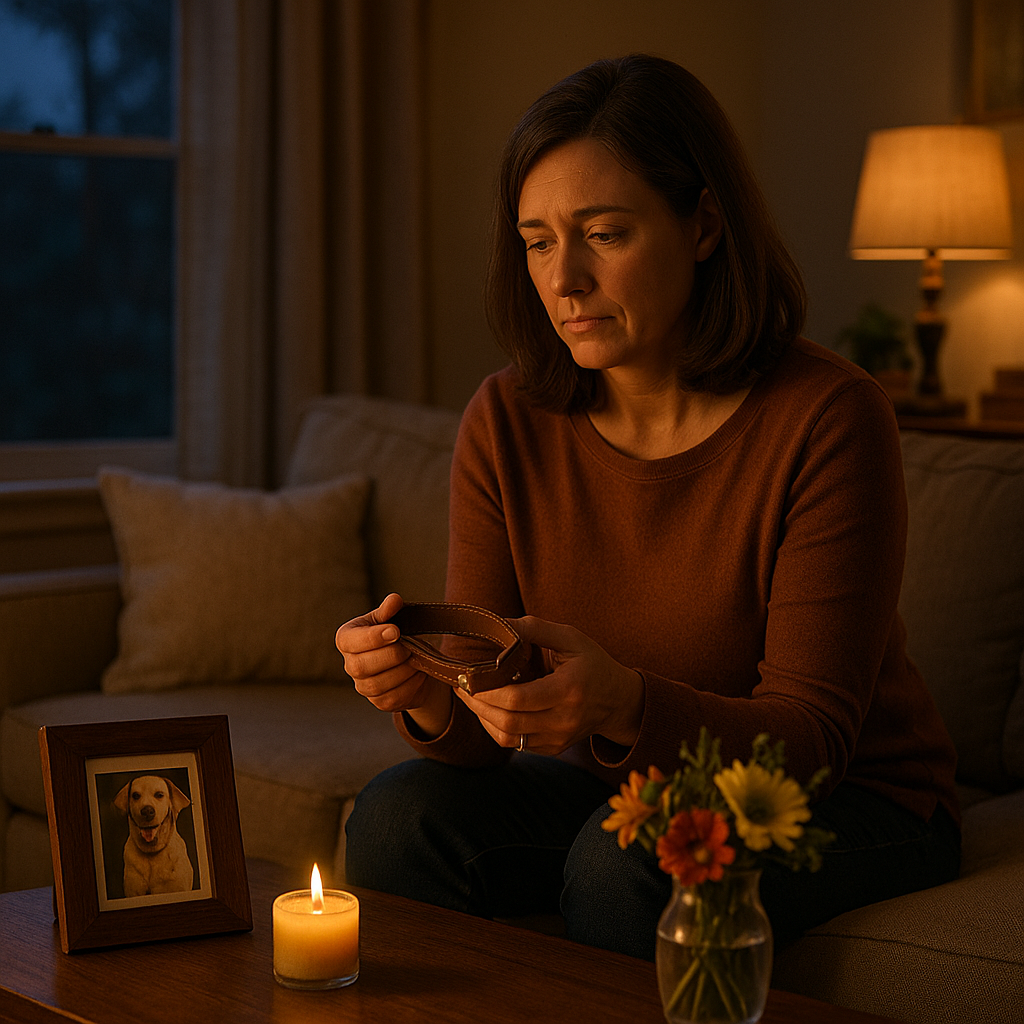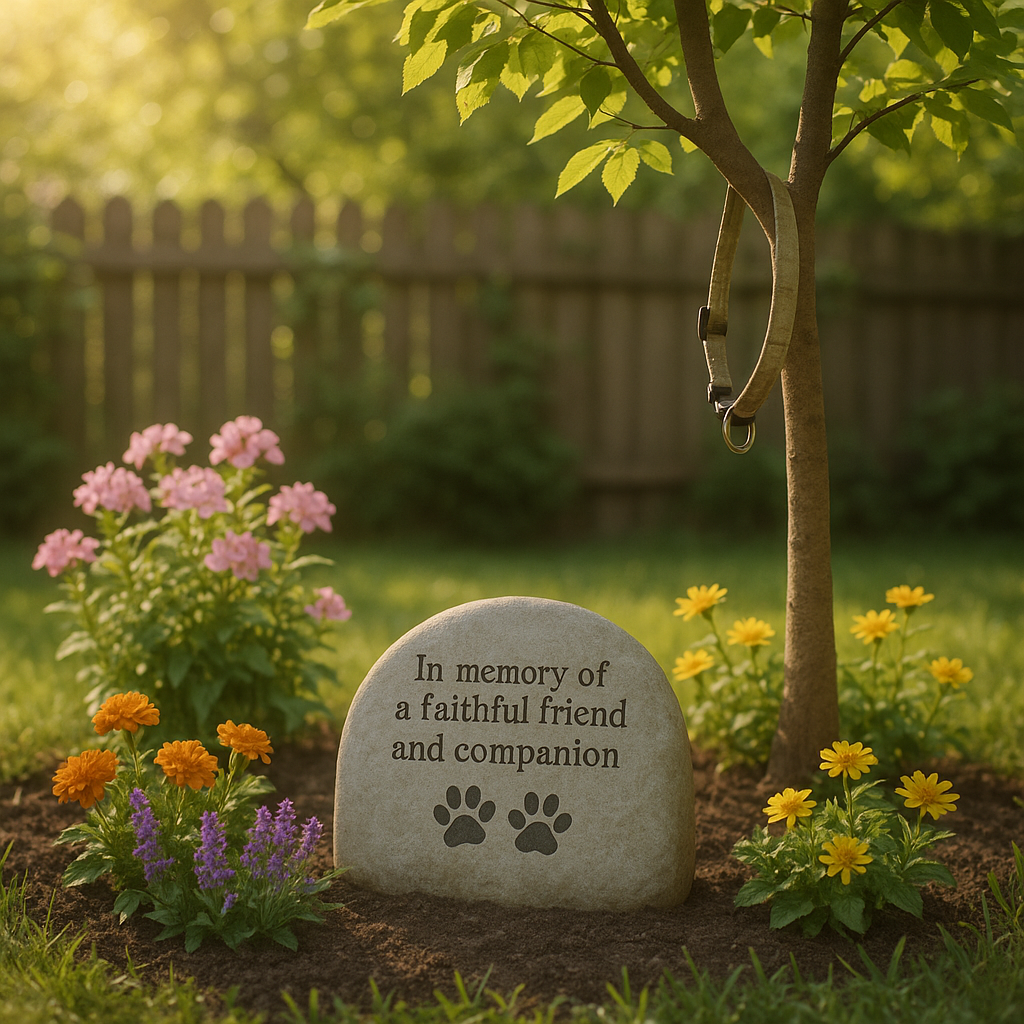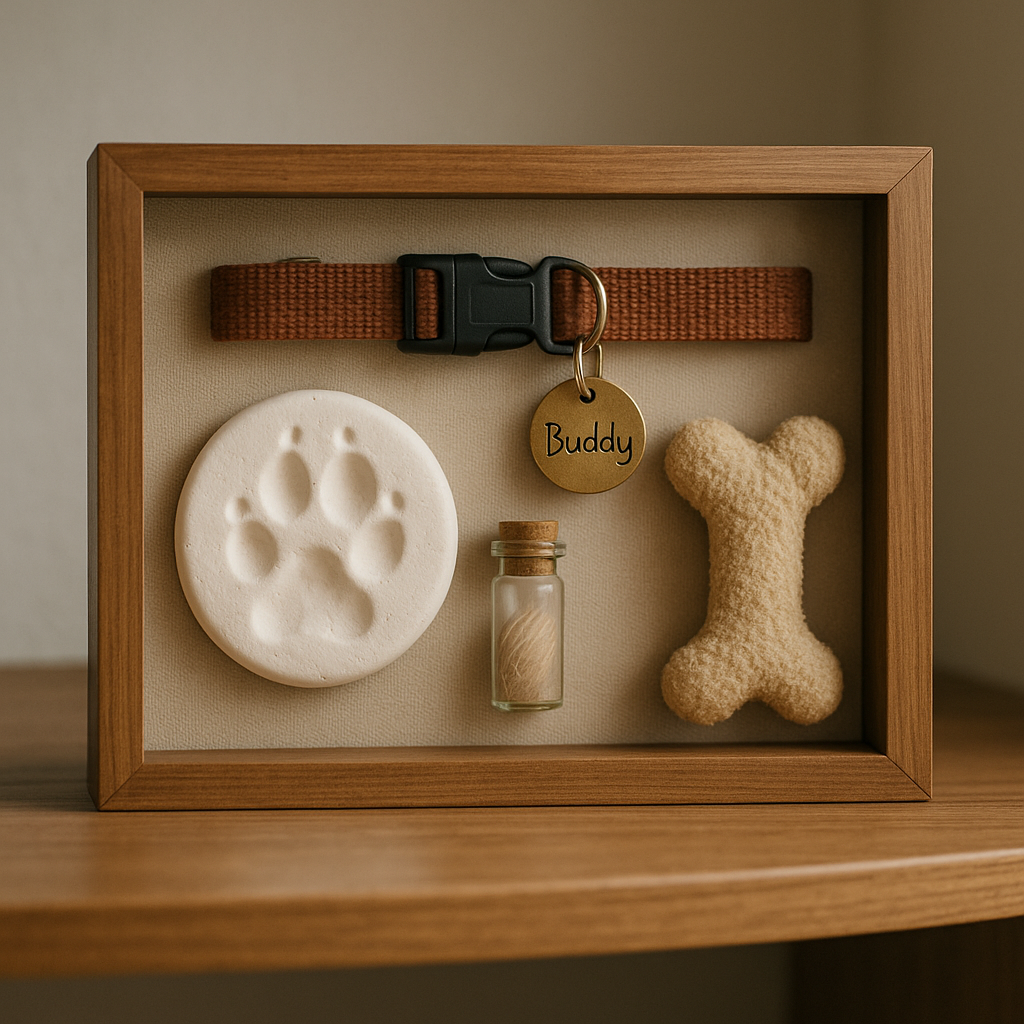
Healing After Pet Loss: Keepsakes and Rituals That Really Help
Share
The connection between humans and their animal companions runs deep—often deeper than words can express. When we lose a pet, the grief can feel overwhelming and, unfortunately, sometimes misunderstood by those who haven't experienced the powerful bond between a person and their animal friend. This grief isn't just about losing a pet; it's about losing a daily companion, a source of unconditional love, and often a significant part of your routine and identity.
Pet loss grief is real and valid. Creating meaningful rituals and keeping tangible reminders of your beloved companion can provide comfort during this difficult journey. As you navigate this emotional landscape, remember there's no single "right way" to grieve. What matters is finding personalized approaches that honor your unique relationship and help you process your feelings at your own pace.
In this article, you'll discover how keepsakes and rituals can provide genuine support during the healing process, learn about various memorial options that have helped others find peace, and explore ways to honor your pet's memory while moving forward with love.
Understanding grief after losing a pet
Pet loss grief often carries unique characteristics that can make the experience particularly challenging. Unlike human relationships, our bonds with pets feature unconditional love without the complications of human interactions. Your pet was likely integrated into nearly every aspect of your daily routine—from morning greetings to evening cuddles—making their absence keenly felt throughout your day.
Many pet parents experience a shift in self-identity after losing an animal companion. You may have been known as "Buddy's mom" or "the lady with the beautiful cats." This change in how you see yourself and how others identify you can intensify feelings of loss and disorientation.
"When a beloved pet dies, the loss can feel overwhelming," explains Dr. Susan Cohen, former Director of Counseling at the Animal Medical Center in New York. "Many people are surprised by the depth of their grief, but the bond we form with pets is incredibly strong and special."
It's important to validate whatever emotions surface during your grieving process. You might experience profound sadness, guilt about decisions you made (or couldn't make), anger at circumstances beyond your control, or even relief if your pet suffered before passing. All these feelings are normal parts of bereavement—even when they seem contradictory or arrive in unpredictable waves.
Stages and expressions of grief
While grief doesn't follow a linear path or predictable timeline, many pet owners report experiencing common reactions after losing their companions. These might include:
- Shock and denial, especially following a sudden loss
- Deep sadness triggered by reminders like an empty pet bed or unused toys
- The painful silence of a home missing familiar animal sounds
- Questions about spirituality and what happens to our pets after death
- Difficulty focusing on regular tasks or maintaining normal routines
- Physical symptoms like loss of appetite or trouble sleeping
Remember that grief is intensely personal. Some people experience all these reactions; others might have entirely different responses. Your journey through pet loss will be as unique as your relationship with your beloved animal companion was.
Rituals for healing: honoring your pet's memory
Creating meaningful rituals provides structure to grief and offers concrete ways to honor your pet's life and importance.
Memorial rituals serve multiple purposes in the healing journey. They acknowledge the significance of your loss, provide a formal opportunity to say goodbye, and create touchstones you can return to when you need comfort. Both formal ceremonies and simple daily practices can help process emotions and maintain a connection to your pet's spirit and memory.
Many people find comfort in organizing a memorial service or gathering. This might be as simple as inviting close friends who knew your pet to share stories and photos, or it could be a more structured ceremony. Consider including elements that reflect your pet's personality or your spiritual beliefs—perhaps lighting candles, reading poems, or playing music that reminds you of special times together.
Nature-based memorials often provide ongoing comfort. Creating a memory garden with your pet's favorite plants or installing a commemorative stone or statue can establish a peaceful place for reflection. Some families plant a tree or flowering shrub in their pet's honor, creating a living memorial that continues to grow and bloom.
Daily or recurring rituals can also support the healing process. This might include:
- Setting aside time each day to look through photos or videos
- Writing letters to your pet expressing your feelings
- Marking important dates like adoption anniversaries or birthdays
- Creating artwork inspired by your pet
- Volunteering at an animal shelter in your pet's memory
Some pet parents find comfort in a custom pet photo pillow that captures their companion's likeness, providing both a visual reminder and a tangible item to hold during difficult moments. These personalized keepsakes can become central to daily remembrance rituals, offering comfort through both sight and touch.
Personalized memorial ceremonies
Creating a ceremony that reflects your unique relationship with your pet can provide meaningful closure and honor their memory. Consider these approaches that others have found helpful:
- At-home vigils where family members share favorite memories
- Beach or park ceremonies where you scatter ashes or release biodegradable lanterns
- Community memorial events organized with friends whose pets were companions to yours
- Religious or spiritual rituals that align with your beliefs about life and afterlife
- Cultural customs specific to your heritage that honor the passing of beloved companions
Art therapy has proven particularly effective for many grieving pet owners. Creating something beautiful that honors your pet—whether it's a painting, poem, song, or craft project—can be therapeutic. The process itself provides an emotional outlet, while the finished piece serves as a lasting tribute.
Storytelling is another powerful healing ritual. Sharing stories about your pet helps preserve their memory and acknowledges the joy they brought to your life. Consider recording these stories in a journal, creating a digital memorial website, or simply gathering with supportive friends to reminisce about funny moments and cherished memories.
Keepsakes and memorial gifts that make a difference
Tangible reminders of your pet can provide immense comfort during the grieving process. Psychologists often refer to this as "active remembering"—the deliberate choice to maintain connections to loved ones we've lost rather than trying to forget and move on. Memorial keepsakes support this healthy grieving approach by providing physical touchpoints for your memories.
The range of available pet memorial items spans from simple, do-it-yourself projects to professionally crafted custom pieces. What matters isn't the cost or complexity, but rather how well the keepsake captures your pet's essence and provides personal meaning to you.
Popular pet memorial keepsakes include:
- Photo albums or digital slideshows capturing different stages of your pet's life
- Custom jewelry incorporating your pet's name, image, or even a small amount of fur or ashes
- Engraved stones for garden placement or indoor display
- Paw print impressions in clay, plaster, or ink
- Custom artwork based on favorite photographs
- Stuffed animals created to resemble your pet
- Shadow boxes displaying collar, tags, and other small mementos
- Memorial plants or trees that bloom around your pet's birthday
"Having something I could hold and look at helped me through the worst days after losing my dog," shares Maria, who received a personalized pet photo keychain from a friend. "Having his sweet face with me everywhere I go makes me feel like he's still part of my daily life."
Not everyone wants visible reminders throughout their home, and that's completely understandable. More discreet options include keepsake boxes where you can store meaningful items like a collar or favorite toy, digital memory books that you can visit when you feel ready, or small tokens you can carry privately like a pocket stone engraved with your pet's initials.
When selecting or creating memorial items, consider what aspects of your pet brought you the most joy. Was it their expressive eyes? Their unique markings? The sound of their purr or the feel of their fur? The most meaningful keepsakes often capture these distinctive qualities that made your companion special.
For those who find crafting therapeutic, creating DIY memorials can be particularly healing. Making a scrapbook, painting a portrait (even if you're not an artist), or assembling a shadow box of meaningful items allows you to channel grief into creation while producing something that honors your beloved companion.
You might find inspiration for personalizing meaningful tributes through exploring engraving ideas: make every gift meaningful, which offers creative approaches to adding personalized touches to memorial items.
Building new routines and finding ongoing support
As the initial shock of pet loss begins to subside, establishing new routines can help you navigate forward while honoring your pet's memory. The absence of daily pet care activities often leaves a painful void—the missing morning walk, feeding times, or evening cuddles can make your home feel eerily quiet.
Consider gradually introducing alternative activities during these particularly difficult time slots. Perhaps use former walking times for gentle exercise, meditation, or connecting with nature. Former feeding times might become moments for self-care or reaching out to friends. This isn't about replacing your pet but about caring for yourself through the transition.
Many bereaved pet parents find solace in helping other animals. Volunteering at shelters or rescue organizations allows you to channel your love for animals in a new direction while honoring your pet's memory. For some, fostering provides the perfect middle ground—offering temporary care to animals in need without making an immediate commitment to new pet parenthood.
Journaling can be remarkably therapeutic during grief. Recording memories, feelings, or even letters to your departed companion provides emotional release and creates a precious record of your relationship. Online communities specifically designed for pet loss support can provide understanding and validation when friends or family don't fully comprehend your grief.
Professional support is available if you're struggling to cope. Many veterinary schools offer pet loss hotlines staffed by trained counselors. Organizations like the Association for Pet Loss and Bereavement provide resources and connect individuals with qualified grief counselors who specialize in animal companion loss.
Self-care becomes especially important during bereavement. Grief can manifest physically through disrupted sleep, changed appetite, or lowered immunity. Prioritizing basics like rest, nutrition, movement, and staying hydrated supports your body through the demanding emotional work of grieving.
Remember that seeking support isn't a sign of weakness but rather acknowledgment that significant loss deserves care and attention. You can learn more about our commitment to supporting those experiencing pet loss through our About Monvaro page, which shares our brand story related to meaningful memorialization.
When and how to welcome a new pet
The decision to bring a new animal companion into your life after loss is deeply personal. There's no universal timeline for when—or even if—this step feels appropriate. Some people find comfort in welcoming a new pet relatively quickly, while others need months or years before they're emotionally prepared. Still others may decide not to have another pet, and this choice deserves respect as well.
Signs of readiness might include:
- Ability to recall memories of your previous pet with more smiles than tears
- Feeling emotionally available for a new relationship
- Practical readiness to meet a new animal's needs
- Understanding that the new pet will have a unique personality
When welcoming a new companion, create space for both honoring your deceased pet and building a fresh relationship. Many families establish a special place or ritual that preserves the memory of their previous animal companion while embracing the joy a new pet brings.
Consider adopting an animal whose needs align with your current lifestyle rather than seeking a "replacement" for your previous pet. This mindset helps foster appreciation for your new companion's unique qualities while respectfully preserving memories of your departed friend.
Conclusion
Healing after pet loss follows no predetermined path or timeline. The journey through grief is as unique as the bond you shared with your beloved companion. By embracing meaningful rituals and creating or collecting tangible keepsakes, you honor both your pet's memory and your own need for comfort during this difficult transition.
Whether you find solace in public ceremonies or private remembrances, elaborate memorials or simple tributes, what matters most is choosing approaches that feel authentic to your relationship and supportive of your healing process. Tangible items like a custom pet photo pillow may provide comfort on difficult days, while rituals create structure for processing complex emotions.
As you navigate forward, remember that healing doesn't mean forgetting. Instead, it means gradually integrating your loss into your life story while finding ways to carry your pet's memory with you. The love you shared remains a permanent part of who you are, even as the sharp edges of grief gradually soften with time.
For inspiration on creating personalized tributes that capture your unique bond, explore engraving ideas: make every gift meaningful, which offers creative approaches to memorializing those we love.
Most importantly, be patient and gentle with yourself through this process. Your grief deserves respect, and your healing deserves time. The love you shared with your pet was real and valuable—honoring that truth is perhaps the most healing ritual of all.
Frequently Asked Questions
What are some ways to memorialize my pet at home?
Consider creating a photo album, planting a memorial tree, lighting a candle on anniversaries, or displaying a custom keepsake like a plush pillow or engraved keychain.
How do I support a friend grieving the loss of a pet?
Offer a listening ear, validate their feelings, gift a thoughtful pet memorial, or suggest joining support groups or online communities.
How long does it take to heal after losing a pet?
Grief is personal and may last weeks or even years. Allow yourself to feel and process emotions at your own pace, seeking support if needed.
Are keepsakes really helpful for coping with pet loss?
Yes, keepsakes provide a tangible connection, help commemorate your pet's unique personality, and can offer comfort during difficult moments.
When is the right time to get a new pet?
Only when you're emotionally ready. There's no set timeframe—some people need months, others longer. Honor your process and memory of your previous pet.
